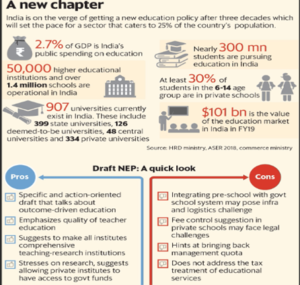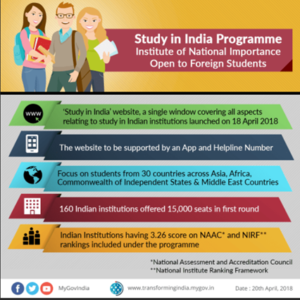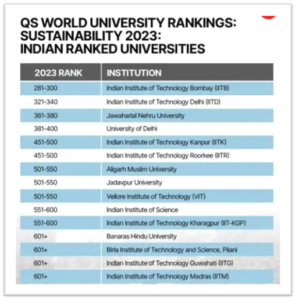Take our campus to world.
Relevance
- GS paper- 2 Government Policies and Interventions for Development in various sectors and Issues arising out of their Design and Implementation.
- Issues Relating to the Development and Management of Social Sector/Services relating to Health, Education, and Human Resources.
- Tags: #iitcampusabroad #globaleducation #nep #genderrepresentationiniit.
Why in the news?
Tanzania and India inked a Memorandum of Understanding (MoU) to open Tanzania’s first IIT branch. The campus is anticipated to open in October 2023 and will initially accept 50 undergraduate and 20 graduate students.
Indian education is gaining global recognition:
- Indian education is gaining global recognition for its quality. Indian universities are ranked among the best in the world, and Indian students are highly sought after by employers.
- This is due to the rigorous academic standards in Indian universities, the strong focus on research, and the diversity of students and faculty.
Digital education is facilitating globalization:
- Digital education is facilitating globalization by making it possible for students from all over the world to access Indian education.
- Indian universities are offering a growing number of online courses, and there are a number of Indian MOOC (massive open online courses) platforms that offer high-quality education at an affordable price.
Government support for globalization of Education
- Establishment of the National Education Policy (NEP) 2020The NEP 2020 is a major reform in the Indian education system. It aims to make India a global education hub by 2030. The NEP 2020 emphasizes on internationalization of education, research and innovation, and skill development.
- Launch of the Study in India Program: The Study in India Program is a government initiative to attract international students to India. The program offers scholarships, tuition waivers, and other financial assistance to international students.
- Creation of ‘Institutions of Eminence’: The Indian government has identified 20 universities and institutions to be developed as ‘Institutions of Eminence’. These institutions will be given special status and funding to help them become world-class universities.
- Promoting joint degree programs: The Indian government is promoting joint degree programs between Indian and foreign universities. These programs allow students to earn a degree from both an Indian and a foreign university.
- Supporting international research collaboration: The Indian government is providing funding and other support to Indian researchers to collaborate with international researchers. This is helping to improve the quality of research in India and to make Indian research more visible to the world.
How New Education Policy 2020 encouraging internalization of Indian Campus-
Joint Degree Programs and Collaborations:
- The NEP encourages the establishment of joint degree programs and collaborations between Indian and foreign universities.
- These initiatives facilitate knowledge exchange, enhance curriculum diversity, and provide students with a global perspective.
Faculty and Student Exchanges:
- The policy emphasizes the importance of faculty and student exchanges with foreign institutions.
- Such exchanges enhance cross-cultural understanding, expose students to diverse teaching methodologies, and foster research collaborations.
Internationalization of Curriculum:
- The NEP suggests incorporating international content into the curriculum to provide students with a broader worldview.
- This enables students to develop a deeper understanding of global issues and prepares them for an increasingly interconnected world.
Credit Transfer and Mobility:
- The NEP introduces a National Academic Credit Bank, which allows students to accumulate credits from multiple institutions and transfer them seamlessly.
- This feature supports students who wish to study abroad or engage in exchange programs without losing academic progress.
Promotion of Indian Languages Abroad:
- The policy advocates for promoting Indian languages, arts, and culture on international campuses.
- Indian institutions abroad can play a role in preserving and promoting the country’s linguistic and cultural heritage.
Global Research Collaborations:
- The NEP encourages Indian institutions to establish research partnerships with international counterparts.
- Collaborative research projects can lead to groundbreaking discoveries and innovations that have a global impact.
Online and Digital Education:
- The policy supports the creation of high-quality online courses and digital learning platforms.
- This facilitates global access to Indian educational resources and enables students from around the world to engage with Indian faculty.
Foreign Qualification Recognition:
- The NEP aims to develop a framework for recognizing foreign qualifications earned by Indian students studying abroad.
- This enhances the mobility of Indian students and professionals across borders.
International Student Recruitment:
- The policy encourages Indian institutions to actively recruit international students, creating diverse and inclusive campuses.
- This enriches cultural exchange and exposes Indian students to global perspectives.
Global Networking and Alumni Engagement:
- The NEP highlights the significance of creating a strong network of Indian educational institutions and alumni associations abroad.
- This fosters a sense of belonging and creates opportunities for collaboration, mentorship, and knowledge sharing.
Challenges and Opportunities in Internationalization of Indian Education-
- Gender representation remains a challenge in institutions like IITs, percentages of women students, researchers and faculty in the engineering disciplines have remained low, though the trend is improving.
- Designing programs, campuses, and institutions while prioritizing access and equity is vital.
- Balancing Excellence and Local RelevanceàMaintaining excellence while ensuring local relevance and global impact.
- Addressing growth aspirations, challenges, and the pursuit of individual freedom and access to quality education.
- Enriching Academic EnvironmentàCollaboration and convivial academic environments are necessary for holistic learning.
- New Model in Indian EducationàIntroducing a new model where Indian institutions establish campuses abroad. IITs are at the forefront of globalizing Indian education, offering international student cohorts and joint degree programs.
The globalization of Indian education is a major step forward for Indian education. It will make Indian education more accessible to students from all over the world, and it will help to improve the quality of education in India. The IIT Madras campus in Zanzibar is a major milestone in this journey, and it is a sign of things to come.
Source: Indian express.
Mains question.
Discuss the key strategies and implications of the internationalization of Indian education as outlined in the National Education Policy (NEP) 2020?






